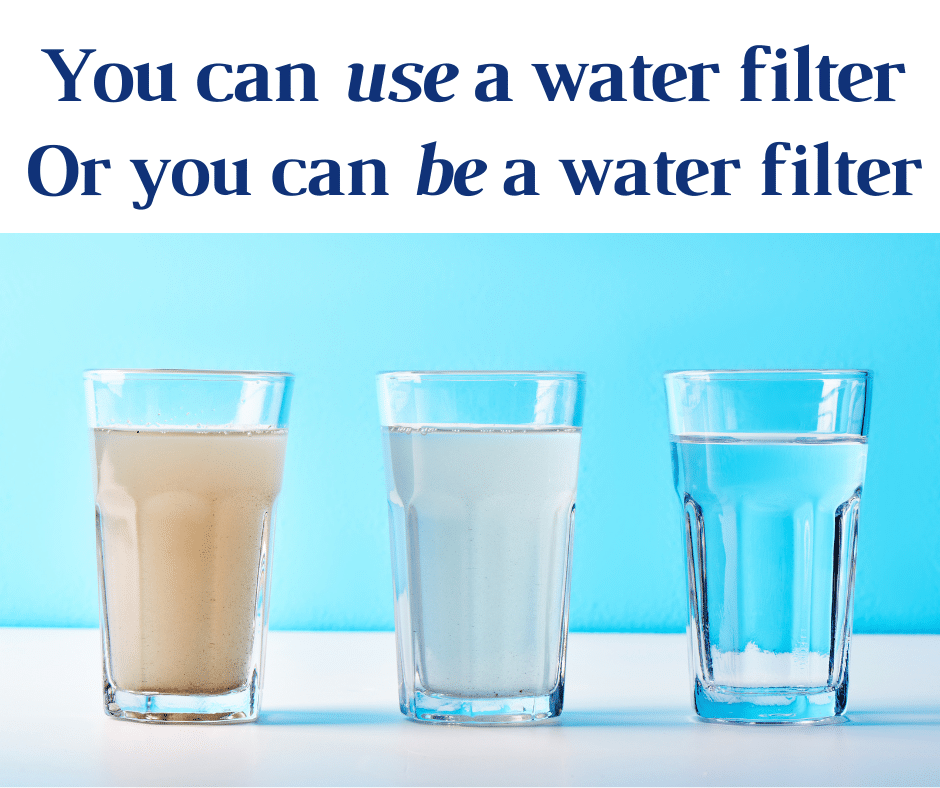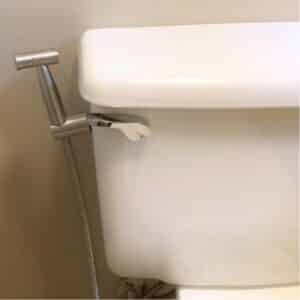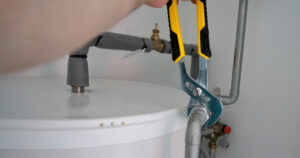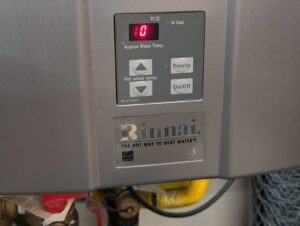The Best Whole House Water Filter for Your Home

Jump to
Know What’s In Your Water
Types of Water Filters
Important Water Filter Certifications
Lake Lanier Water Quality
How to Choose the Best Whole House Water Filter for Your Family
In today’s world, with increasing awareness about health and the environment, finding the best whole house water filter has become more important than ever. Tap water can contain contaminants like chlorine, lead, pesticides, and bacteria, which can negatively affect your health and well-being. Installing a whole house filtration system helps ensure every faucet in your home provides clean, safe water.
The Best Whole House Water Filter Can Save You Money
Many families rely on bottled water to avoid the risks of tap water. However, bottled water has its own set of issues.
Environmentally, plastic bottles create significant waste, contributing to pollution.
Financially, bottled water quickly becomes expensive. In fact, an average family of four can spend over $1,000 per year on bottled water alone—a significant cost that adds up year after year.
A better, more sustainable, and cost-effective solution is investing in the best whole house water filter for your household. A couple of reusable bottles and a whole home water filtration system can save you money, protect your appliances, and reduce plastic waste.
Protecting Your Family Beyond Drinking Water
Even if you drink bottled water exclusively, contaminants from unfiltered tap water still pose a risk. Showering and bathing expose your skin and respiratory system to harmful chemicals and toxins. These contaminants can be absorbed directly through your skin or inhaled from steam, contributing to your body’s overall toxin exposure.
Choosing the best whole house water filter ensures every drop of water in your home—whether for drinking, showering, cooking, or laundry—is free from harmful contaminants.
To Find the Best Whole House Water Filter, Know What’s in Your Water
To find the best whole house water filter, you need to start by knowing what exactly needs filtered out of your water.
Before deciding which whole home water filter is best for your household, it’s smart to start by reviewing your local water quality report. Each year—typically before July 1st—your water provider is required by the Environmental Protection Agency (EPA) to send out a report known as a Consumer Confidence Report (CCR) or Water Quality Report.
This report provides key insights about your local water supply, including:
- Where your water comes from (your water source)
- What contaminants may be present in your water
- Which chemicals are used in the disinfection process
It also includes statistics on regulated substances and whether your water meets federal safety standards. By reviewing this report, you can better understand which contaminants you’re dealing with—and make a more informed decision when choosing a filtration system.
Online Water Quality Tools
In addition to the report mailed to you each year, you can easily access your water quality information online. The Environmental Working Group (EWG) offers a searchable national drinking water database where you can look up your water supply by zip code. The EPA also provides a directory of local Consumer Confidence Reports. You can also use this helpful tool to see a report specific to your zip code.
Most local water suppliers post their water quality reports directly on their websites, so you can usually find the most recent report with just a few clicks. Gwinnett County, Forsyth County and Fulton County publish their testing data online. If you’re not sure where to look, a quick call to your local water department can point you in the right direction.
Once you understand what’s in your water, you’ll see why choosing the best whole house water filter matters so much.
Finding the Best Type of Whole House Water Filter For Your Home
When choosing the best whole house water filter, it’s important to understand your options. Here are the most common types of whole house water filters, how they work, what contaminants they remove, and their general cost range (from highest to lowest investment):
Sediment Filters
How They Work:
Sediment filters are typically the first line of defense in a whole home filtration system. They physically remove larger particles such as dirt, sand, rust, and silt from your water supply.
Water heater sediment build up is a common problem in tank water heaters. It makes it harder to heat your water, as it acts like a barrier between the heat source and your water. Take a look at some examples of water heater sediment to understand what could be in the hot water you use to bathe and wash dishes.
Pros:
- Protects other filtration stages from clogging
- Improves overall water clarity
Cons:
- Does not remove chemicals, heavy metals, or microorganisms
Activated Carbon Filters
How They Work:
Activated carbon filters use porous carbon to trap and adsorb contaminants. Water passes through the filter, and impurities bind to the carbon surface.
Pros:
- Reduces chlorine, VOCs, pesticides, and bad tastes and odors
- Affordable and low-maintenance
Cons:
- Not effective at removing dissolved inorganic substances like nitrates or heavy metals
Reverse Osmosis (RO) Systems
How They Work:
RO systems force water through a semi-permeable membrane, filtering out contaminants at the molecular level.
Pros:
- Highly effective at removing fluoride, arsenic, lead, nitrates, and PFAS
- Produces very pure water
Cons:
- Removes beneficial minerals, potentially lowering pH
- Can produce wastewater
To address this, Aquasana’s SmartFlow® Reverse Osmosis Filter includes remineralization technology that restores essential minerals like calcium and magnesium and helps rebalance pH levels.
Ultraviolet (UV) Purification Systems
How They Work:
UV systems use ultraviolet light to neutralize microorganisms by disrupting their DNA, rendering them harmless.
Pros:
- Effective against bacteria, viruses, and parasites
- No chemicals involved
Cons:
- Does not remove non-living contaminants (like chemicals or metals)
- Requires electricity
Water Softeners
How They Work:
Water softeners remove hardness-causing minerals like calcium and magnesium through an ion exchange process, replacing them with sodium or potassium.
Pros:
- Prevents scale buildup in plumbing and appliances
- Improves soap and detergent performance
Cons:
- Adds sodium to water
- Does not filter out other contaminants
Acid Neutralizers
How They Work:
These systems use calcite or magnesium oxide to raise the pH of acidic water, preventing corrosion in pipes and fixtures.
Pros:
- Reduces plumbing corrosion
- Improves water taste
Cons:
- Can increase water hardness
- Requires regular media replacement
Iron and Manganese Filters
How They Work:
These filters oxidize dissolved iron and manganese so they can be captured and removed from your water supply.
Pros:
- Prevents staining on sinks and laundry
- Improves water clarity and taste
Cons:
- Requires regular maintenance to clean filter media
- May need pre-treatment if iron levels are very high
The Best Whole House Water Filter is a Certified Filter
Whether you choose a carbon filtration system, a reverse osmosis unit, or a combination of both, the best whole house water filter must be certified to do what it promises—remove harmful contaminants from your water.
That’s where NSF certification comes in. The National Sanitation Foundation (NSF) is a trusted, third-party, nonprofit organization that sets rigorous public health standards and certifies products across a variety of industries, including water filtration. NSF certification helps consumers identify filters that meet established performance and safety requirements.
To be sure you’re getting the best whole house water filter, look for certification under one or more of these NSF/ANSI standards:
- NSF/ANSI Standard 42 – Focuses on improving aesthetic aspects of water, such as chlorine taste and odor, as well as removing particulates.
- NSF/ANSI Standard 53 – Covers health-related contaminants, requiring filters to reduce substances like lead, mercury, VOCs, cryptosporidium, and giardia. This standard also now includes PFOA/PFOS under Standard P473, which are emerging contaminants linked to long-term health effects.
- NSF/ANSI Standard 401 – Tests filters against up to 15 emerging contaminants, including pharmaceuticals, pesticides, and herbicides, which have been found in trace amounts in some drinking water supplies.
- NSF/ANSI Standard 58 – Applies specifically to reverse osmosis systems and sets standards for reducing total dissolved solids (TDS), including fluoride, nitrate, lead, and other harmful substances.
When in doubt, check the product packaging or the manufacturer’s website for NSF certification. This small step can make a big difference in making sure that you’re investing in the best whole house water filter for your home.
Seasonal Update: Why Forsyth County Water May Taste or Smell Different Right Now
If you live in Forsyth County and don’t have a whole house water filter, you may have noticed a temporary earthy taste or odor in your tap water, especially when using hot water in the shower or at the sink. This seasonal issue has become more common in late summer and early fall, and many homeowners are asking what’s causing it and whether it’s a safety concern.
According to the Forsyth County Water and Sewer Department, the water remains completely safe to drink. The unusual taste and smell are linked to naturally occurring organic compounds called Geosmin and Methylisoborneol (MIB), which come from algae in Lake Lanier, the county’s primary water source.
What’s Causing the Taste and Odor?
During late summer and early fall, warm temperatures, sunlight, and natural nutrients create ideal conditions for algae growth. When algae die, they release trace amounts of Geosmin and MIB into the water. These compounds are not harmful, but they can affect the taste and smell.
Forsyth County’s recent tests confirm that Geosmin and MIB levels are higher this year than in the past, though still only in parts-per-trillion. Some people never notice them, while others are extremely sensitive to these compounds. Heating the water can amplify the smell, which is why some homeowners notice it most in the shower.
What the County Is Doing
Forsyth County uses a powdered activated carbon (PAC) treatment to reduce these compounds. While PAC greatly lowers the levels, it cannot remove all of them. The county also performs more than 1,300 water quality tests each year and continues to meet all state and federal drinking water standards.
As a long-term improvement, Forsyth County is adding ozone disinfection to the treatment process. This upgrade will significantly improve the county’s ability to reduce Geosmin and MIB and is expected to be completed within the next 12 months.
How Long Will It Last?
As temperatures cool and lake conditions shift, Geosmin and MIB levels naturally drop. Forsyth County reports that this year’s levels already began declining in early October. Most households will see the taste and odor fade as the season changes.
How a Whole House Water Filter Helps
While Forsyth County water is safe, many homeowners prefer to improve taste, smell, and overall water quality, especially during seasonal changes. The best whole house water filter can provide clean, fresh-tasting water from every faucet in your home.
A whole house water filter can:
- Reduce unpleasant tastes and odors caused by organic compounds
- Improve the shower and bath experience, where heated water makes odors more noticeable
- Provide consistent, better-tasting water year-round
- Protect appliances and plumbing from impurities in unfiltered water
- Offer peace of mind when water conditions vary throughout the year
For families who want a more enjoyable and reliable water experience, a whole house water filter is one of the most effective long-term solutions.
Gwinnett vs Forsyth County Water
While both Gwinnett County and Forsyth County draw their drinking water from Lake Lanier, the difference in taste and odor complaints comes down to each county’s treatment process. Gwinnett County uses advanced ozone disinfection and granular activated carbon (GAC) filtration as standard steps in their water treatment system, which are highly effective at removing geosmin, MIB, and other organic compounds that can cause earthy smells during late-summer lake turnover.
Forsyth County currently uses powdered activated carbon (PAC), which helps reduce these compounds but does not eliminate them as completely as ozone and GAC. Forsyth has already announced plans to add ozone treatment in the coming year, but until then, residents may be more likely to notice seasonal taste and odor changes in their tap water. A whole house water filter can help bridge that gap by improving taste, smell, and overall water quality at the tap.
If you’d like help choosing and installing the right whole house water filter for your Forsyth County home, the team at Aaron Services can guide you through the best options.
Aaron Services Provides the Best Whole House Water Filter Solutions
At Aaron Services: Plumbing, Heating, Cooling, we understand the importance of clean, safe water throughout your home. That’s why we offer high-quality whole house water filtration systems, including the Halo product line. Halo’s advanced filtration technology, such as the Halo H2 Zero, effectively removes harmful contaminants like chlorine, lead, pesticides, and bacteria.
Investing in a whole house filtration system is not only beneficial for your family’s health, but it’s also financially wise. Over time, the savings from eliminating bottled water will offset the initial investment, making a whole house water filter an affordable, smart choice.
Choose Aaron Services for Reliable Whole House Filtration
Choosing the best whole house water filter isn’t just about convenience—it’s about protecting your family’s health, preserving the environment, and saving money. With Aaron Services and Halo’s proven products, you’ll have peace of mind knowing your water is clean, safe, and healthy for everyone in your household.
Ready to take the next step toward better water? Contact us today to discuss the best whole house water filtration options for your family.






